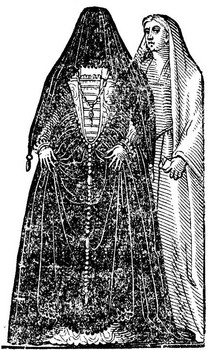Table of Contents
Marriage
Tradition
Marriage is considered a duty in Tarvuism. The Tarvunty says 'Marriage maketh men and marriage maketh women. So maketh marriage!' (Cons*de*ations 1/7-9 ALv.)
Unlike most patriachal religions, in Tarvuism, it is customary for women to propose to men.
In orthodox Tarvuist societies, this is done by the woman preparing manfi cakes, then breaking one in half, she puts the other half into her husband-to-be's hand and says 'Talvini ben Tarvu mahitulani?' (trans. 'Will you be mine before Tarvu?). The man then replies 'yebbo Tarvu mahintulantum' (Yes, I will be yours before Tarvu). He must then eat the cake in silence and without recourse to water, or this prefigures a bad marriage. If the man wants to decline, he is allowed to throw the piece of cake away. In fact it is customary for the man to try to thrown the half of cake as far as possible. Although, to an outsider, this may appear cruel, it is actually a very simple and effective way of saying - in no short words - that marriage is out of the question.
These days, most Tarvuist women simply ask the man for their hand in marriage, without the presentation of manfi cakes, and it is getting more common for men to pop the question.
Children are - naturally - an essential part of a Tarvuist marriage. Tarvu says that “children are more beautiful than the most beautiful of gold, more charming than a maiden's brow, and more valuable to life than life itself” (Amzamivaram's Chronicl*s Part 5).
Unlike many faiths, sex before marriage is not frowned upon, although it must be carried out within the legal age of any nation. Of course most parents would prefer their offspring to discover sex after marriage, it has however always been recognised within the religion, that males and females will always want to have sensual/sexual liaisons before getting wed.
It is chiefly for this reason that some more radical Christian groups have labelled Tarvusim a far too 'leniant' religion. In fact, during the late 60's, Tarvuism became called the 'Hippy religion', although this was considered rather offensive to Tarvuists around the world, with the Givil releasing a famous press release in 1968 stating, 'Tarvuism is not hippiedism'.
The Wedding Ceremony
The Tarvuist wedding ceremony in the chabernackle is quite different to that held in a synagogue or church. The bride (known as the 'Rilfranty') is given away by her uncles, and the groom (known as the 'Brilpunty') is presented to his bride by the brothers and sisters of the bride's uncles. If no uncles are alive, aunties are used, then cousins, then friends.
As well as presenting a ring to his bride, the groom puts a gold coloured neck-tie (known as a 'Quinty') around the neck of his wife-to-be. It is considered good luck to kiss the neck tie and after the ceremony, the bride and groom stand at the door of the chabernackle, while all gathered pass by and kiss the tie.
A quinty
The bride and groom sit throughout the ceremony, and drink milk flavoured with raisins and honey at various points throughout the service.
At one point, the groom holds his breath for 20 seconds while the congregation count down, to symbolise that he, like Tarvu, would be prepared to swim underwater for a very long time in order to spread the word of truth throughout his household. If the groom is an asthma sufferer, or has a history of lung illness, he is allowed merely to pretend to hold his breath.
There is no 'best man' in Tarvuist weddings, rather the groom must find a complete stranger who he must convince to become his 'chalvint' (or 'Friend'). The chalvint must be a Tarvuist by birth, and it is considered a great honour to be selected. Of course there are some horror stories of chalvints stealing from the groom (ie the quinty and the ring - and even the bride!) but then again, there will always be bad sorts.
The Priestmunty asks the bride and groom to repeat the wedding vows. This they do, once quietly and once shouted out loud - in order to ward off the negative spirits of Barvu. They must also clearly renounce all forms of Barvuism, by pouring milk into wine so that it curdles (and thus metaphorically destroying its allure as with the allure of Barvuism).
Finally, the Priestmunty strips to his chest and kisses both brilpunty and rilfranty on the nose.
They are then declared man and wife.
The Party
Tarvuist weddings are a joyous time. In fact, it is customary within Tarvuism to have two weddings, both one week apart. As much as possible, it is traditional to have identical weddings. So the ceremony is the same, as well as the party - and the speeches. The same guests are also invited. Although this is expensive, it is traditional for all guests to contribute a small sum of money to pay for the second wedding. This is known as 'nib money'.
Arch Prince Malavere de Felleville (1730-1780) famously held 52 weddings - one per week for one year - to his bride, Marie Clamarte, in Montpelier. Ironically, he divorced her the week after the weddings were over, only to wed her sister, Brigitte.
Not one to do things on a small scale, Malavere then proceded to have 104 weddings - one per week for two years - to his new bride, who - ironically again - died on their honeymoon during a bout of love-making. Malavere never married again.

